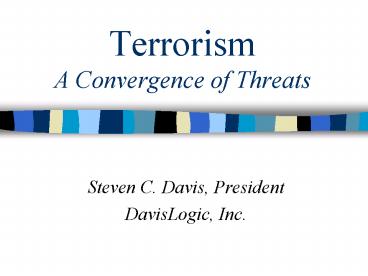Terrorism A Convergence of Threats
1 / 21
Title:
Terrorism A Convergence of Threats
Description:
Critical Infrastructure Assurance Office - PDD-63 charges CIAO with integrating ... CIAO will also assist in coordinating a national education and awareness. ... –
Number of Views:77
Avg rating:3.0/5.0
Title: Terrorism A Convergence of Threats
1
TerrorismA Convergence of Threats
- Steven C. Davis, President
- DavisLogic, Inc.
2
Terrorism Threats
- Foreign and Domestic Terrorism
- Cyberterrorism and Cyberwarfare Cybercrime and
Cyberanarchism - Critical Infrastructure - risk in flaws, defects
and attacks - Cyber refers to computers, the Internet, and
the interconnectedelectronic village this is
also referred to as InfoWar.
3
Critical Linkages
Critical Infrastructure
Circles of Risk
4
Critical InfrastructureInformation
Communications
- Computing and telecommunications systems are
critical components of our daily lives and our
economy. The data and information communicated
across this infrastructure is valuable and
sensitive.
5
Critical InfrastructurePower Systems
- Electrical power systems that create and supply
electricity are fundamental to the basic
functionality of the rest of our infrastructure.
6
Critical InfrastructureGas and Oil
- Natural gas and petroleum are also critical to
the operation of our economy and to the ships,
trucks, and rail systems that transport
commodities.
7
Critical InfrastructureBanking and Finance
- Retail and commercial banks, investment
institutions, and exchanges work to assist
business and government operations in all manner
of monetary transactions.
8
Critical InfrastructureTransportation
- Trains, planes and automobiles, as well as
ships and pipelines use airports, roads, ports
and waterways to delivery goods to businesses and
governments.
9
Critical InfrastructureWater Supply Systems
- Water is a critical to human existence and to
many industrial processes. Reservoirs, transport
systems, filtration, cleaning and treatment
systems are part of this infrastructure.
10
Critical InfrastructureEmergency Services
- State, local, and Federal law enforcement,
fire, and rescue services are called upon to
respond to individual and community needs during
emergencies as well as in recovery.
11
Critical InfrastructureGovernment Services
- Federal, state and local governments provide
essential services to the public.
12
How Might Terrorists Target Critical
Infrastructures?
- Denial or disruption of service
- Unauthorized monitoring
- Unauthorized disclosure of information
- Unauthorized modification or destruction of
computer programs - Fraud, financial loss or other criminal
activities - Source FBI
13
Our Systems are Fragile
- Some infrastructure is so critical that if it is
compromised or destroyed, an entire region, or
the nation, could be debilitated. - Information warfare is the second most serious
threat to U.S. national security, just below
weapons of mass destruction in terrorist hands.
14
Are we vulnerable?
- We are increasingly reliant upon interdependent
infrastructures. - Because of our strengths, enemies may seek to
harm us in new ways. - Millennial madness may increase the likelihood of
non-technical attacks such as bioterrorism.
15
Are we vulnerable?
- Cyber attacks on our infrastructure and
information systems may be capable of
significantly harming our military, our
infrastructure, and our economy.
16
Former Deputy Secretary of Defense John Hamre
- The United States has moved so dramatically to
the use of micro-processors to control our basic
infrastructure.... All of these are controlled by
computers where security was never designed in at
the outset.
17
OK, So what to do?
- Safeguarding Our Citizens
18
Safeguarding Our Citizens From The Threat Of
Deadly Weapons
- Defending the United States against chemical and
biological weapons is a top priority. - Budget includes funding for vaccines, medical
stockpiles, research, surveillance, and medical
response teams. - New technology increasing protection
19
Safeguarding Our Citizens
- Critical Infrastructure Assurance Office -
PDD-63 charges CIAO with integrating sector plans
into a National Infrastructure Assurance Plan. - CIAO will also assist in coordinating a national
education and awareness.
20
Safeguarding Our Citizens
- Need continued investment to defend our critical
infrastructure - RD to protect systems and prevent intrusion
- Private Sector Information Sharing and Analysis
Centers (ISACs)
21
Emergency Management
- Increase Awareness at the Local Level
- Provide Security Communications Redundancies
- Update Plans, Policies, Procedures
- Educate the Public to Threats































